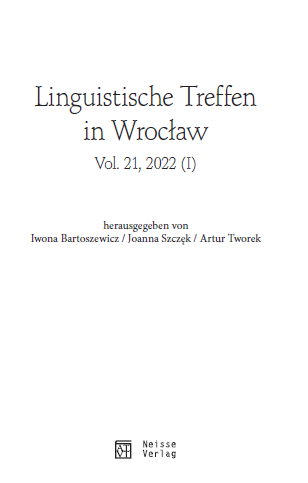Pragmatik und Recht: Kriminelle Sprechakte
Pragmatics and Law: Criminal Speech Acts
Author(s): Jörg MeibauerSubject(s): Criminal Law, Pragmatics
Published by: Oficyna Wydawnicza ATUT – Wrocławskie Wydawnictwo Oświatowe
Keywords: Bullshitting; criminal speech act; conversational implicature; insult; lying; perjury;
Summary/Abstract: Pragmatics and Law is an important subfield of theoretical and practical (or “applied”) pragmatics. This article is about criminal speech acts. These are those speech acts for which one can be punished in a given legal system. Criminal speech acts do not form a separate speech act class like assertives or expressives, but occur in all classes. They can be realized both directly and indirectly. Indirect realization involves indirect speech acts in the sense of speech act theory or conversational implicatures in the sense of conversational implicature theory. Two sets of issues are considered in more detail. The first is the area of lying, where lying is regarded as an insincere assertion with the aim of deception. The law does not recognize a separate criminal offense of lying. Nevertheless, lying can be punished in certain contexts. A relevant case is lying in court under oath (perjury). Bullshitting differs from lying in that the bullshitter is indifferent to the truth. Bullshitting thus appears as a practical option to avoid committing to a fact. Moreover, it is asked whether lying is possible through the realization of a deceptive conversational implicature. The second set of issues is the field of insults and hate speech. In the case of insults, it is striking that in every language there are lexical expressions (insult words) that serve the purpose of realizing an insult. They are illocutionary indicators in the sense of speech act theory. Hate speech, which includes the denigration of certain groups in the sense of incitement to hatred, is understood as a type of insult. This means that hate speech is, in principle, covered by the rules for the execution of an insult. The legal assessment of criminal speech acts is based, on the one hand, on concrete utterances and, on the other hand, on an assessment of the utterance context. It turns out that there can be considerable differences in the assessment of criminal speech acts, which has to do with the inherent complexity of these concepts.
Journal: Linguistische Treffen in Wrocław
- Issue Year: 21/2022
- Issue No: 1
- Page Range: 143-163
- Page Count: 21
- Language: German

